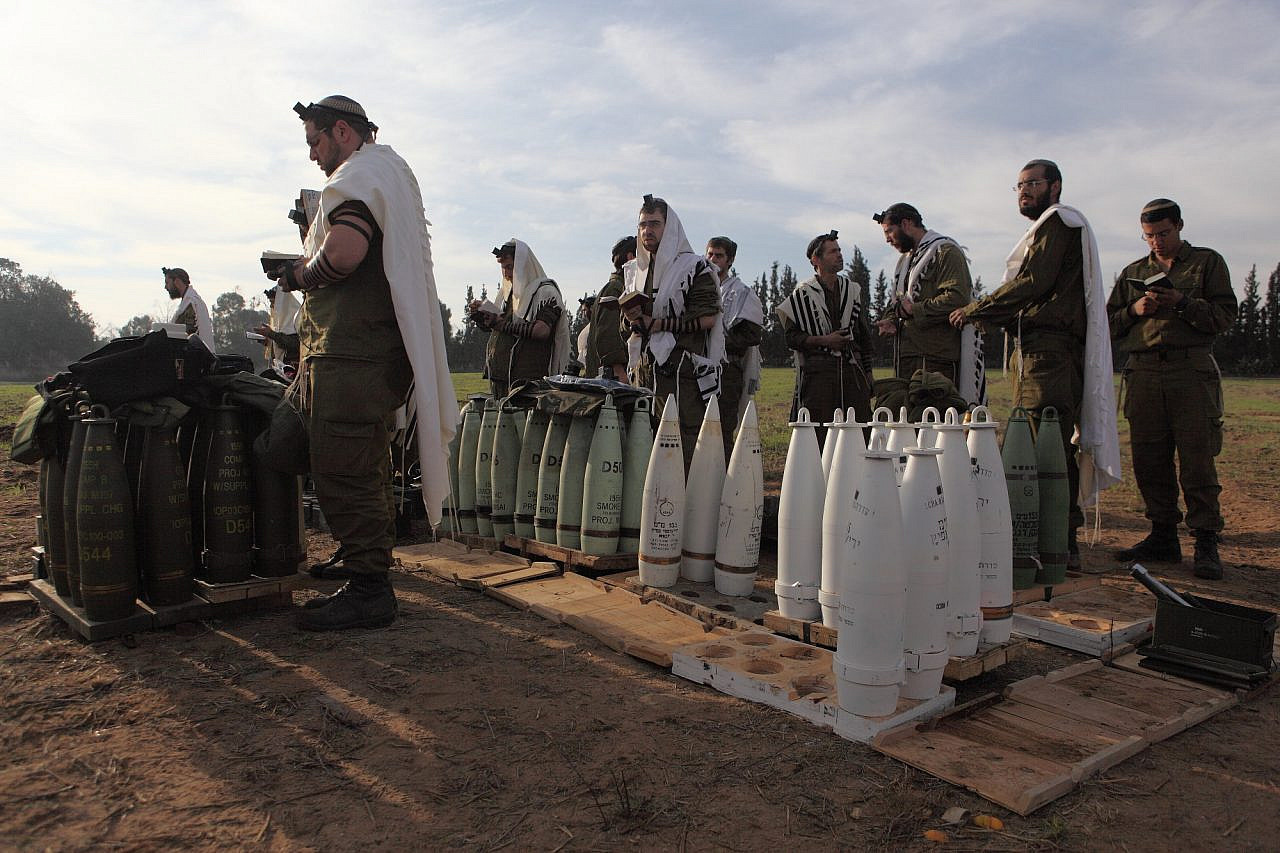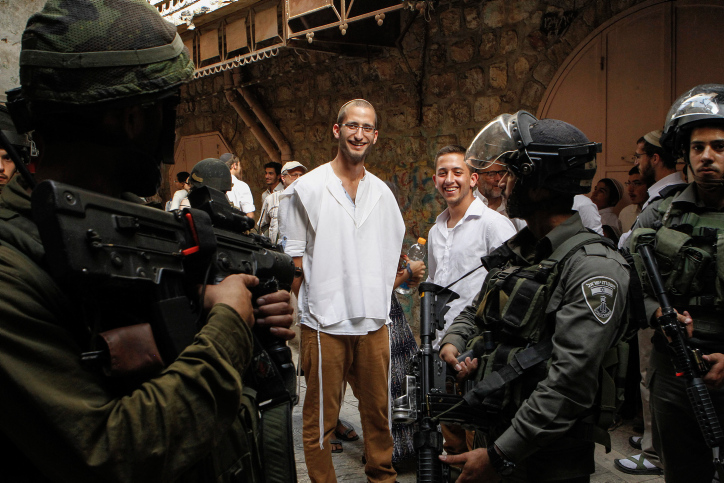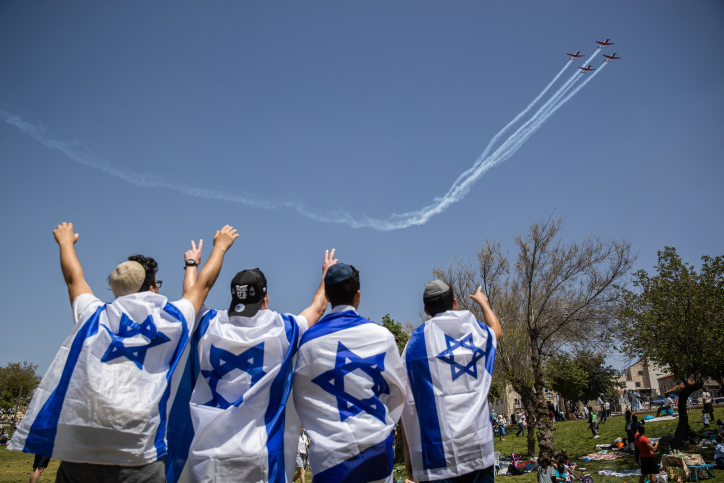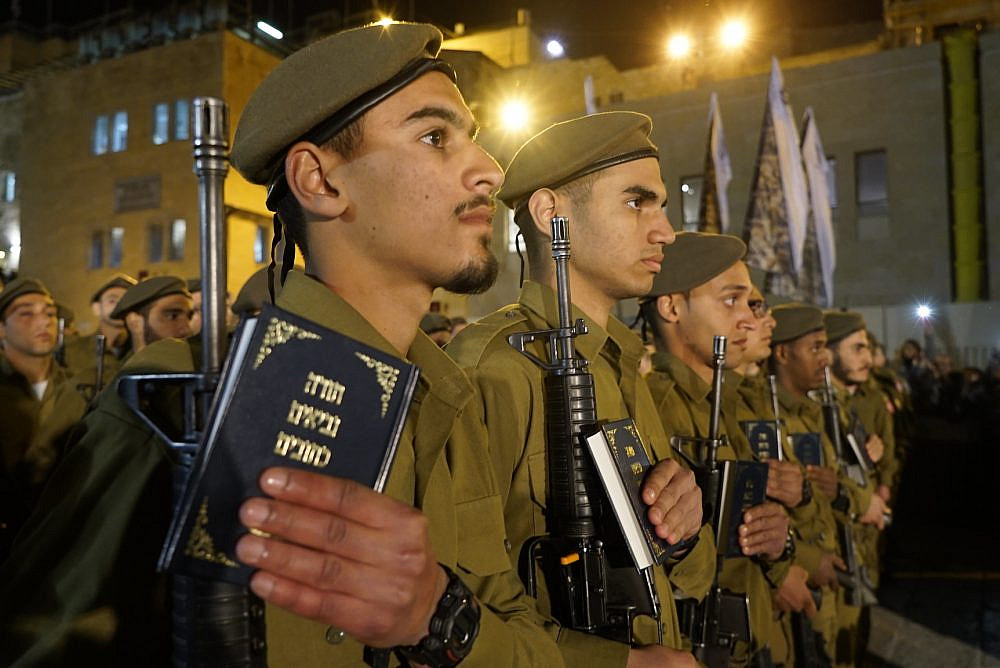“Armed with Legitimacy: Justifications for Military Violence in Israeli Society,” Edited by Ofra Ben Ishai and Yagil Levy, Pardes Publishing, 2021 (Hebrew).
In late August, on the eve of Naftali Bennett’s White House meeting with President Biden, the Israeli prime minister gave an interview to the New York Times in which he outlined his government’s agenda. “This government will neither annex nor form a Palestinian state, everyone gets that,” Bennett said. “I’m prime minister of all Israelis, and what I’m doing now is finding the middle ground — how we can focus on what we agree upon.”
After years of lip service by Israeli leaders to the two-state solution or to the annexation of “the historic homeland” of Judea and Samaria (the biblical names for the occupied West Bank), Bennett finally articulated the undeniable reality in Israel-Palestine: as far as Israelis are concerned, the status quo is the solution. The status quo is also the common denominator upon which his government is built — the glue holding together a coalition that includes the Palestinian Ra’am party, the liberal Meretz, and the national-religious, pro-settlement Yamina.
Two complementary projects lie at the heart of the status quo: Israel’s military control over nearly five million Palestinians in the occupied territories, and the gradual colonization of the West Bank. Technically, Israel views the West Bank as “disputed” rather than occupied, and, since the 2005 disengagement, Israelis no longer believe Gaza to be under Israeli occupation. Yet in practice, the Israeli military controls both.
The IDF has been the sovereign power in the West Bank for nearly 55 years, and the commander of the IDF Central Command (the regional command that oversees the West Bank) has extensive legislative powers over the Palestinian population. Palestinian civilians are tried in military courts, and it is the army that issues them permits allowing them to cross the Green Line and work inside Israel. In places like Hebron or Area C (the parts of the West Bank under complete Israeli rule), military control is direct and highly visible, with soldiers carrying out everyday policing duties; in other places, this control takes more subtle forms, or is carried out through the Palestinian Authority as a subcontractor of the Israeli occupation.
While things are a bit more complicated in Gaza, which Israel formally left in 2005, the nearly 15-year blockade on the strip is clearly a policy of control. As in the West Bank, Israel’s military is charged with issuing permits to Gazans, administering their registration in the population registry, determining how and where Gaza’s fishermen can fish, controlling the airspace, and deciding which goods will enter or exit Gaza.

This regime of military control neither seeks nor expects legitimacy from the population under its rule. Palestinians are not part of the Israeli political system, are not represented in the governing institutions, and have no say on the major decisions concerning their lives. Since Palestinians would never agree to such arrangements of their own free will, the only way to maintain this system is by force — through the use or threat of violence.
Legitimizing violence
Since the Second Intifada and the collapse of the Oslo process, many critical Israeli scholars, journalists, and documentary filmmakers have moved from researching the historical reasons for the occupation — and from arguing over its moral grounds or imagining the possible political arrangements the would replace it — into researching how the occupation works, and what makes it so resilient.
For the activists among these Israelis, this shift has represented a recognition of their limited role in bringing an end to the occupation, while ushering in more sophisticated uses of their privileged access to Jewish society and to Israeli institutions. It has also served as a new way of raising moral and political questions, after the old ones have reached a dead end. Finally, and perhaps more tragically, this change is a result of both Jewish-Israeli and Palestinian society turning away from each other and focusing inward.
Examples of this new approach include a class of new books and films, including Yael Berda’s “Living Emergency: Israel’s Permit Regime in the Occupied West Bank”; “The One-State Condition: Occupation and Democracy in Israel/Palestine” by Adi Ophir and Ariella Azoulay; Michael Sfard’s “The Wall and the Gate: Israel, Palestine, and the Legal Battle for Human Rights” and films such as “The Law in These Parts” and “The Viewing Booth,” both by Ra’anan Alexandrowicz.
“Armed with Legitimacy: Justifications for Military Violence in Israeli Society,” a Hebrew-language collection of academic essays edited by Ofra Ben Ishai and Yagil Levy, is an important and much overdue addition to this body of work. It focuses on the primary Israeli institution that Palestinians are forced to deal with — and, strangely, one that gets very little attention: the Israeli military.
Ben Ishai is a former head of the behavioral science department of the IDF. Levy, a professor of sociology at Israel’s Open University, is one of the most original and interesting thinkers on the relations between the Israeli military and Israeli society. More than a decade ago, he published a column analyzing the role human rights NGOs play in normalizing the occupation, in which he argued that the presence of human rights groups actually aids the IDF’s control over the behavior of its soldiers — constituting a form of privatization of the state’s supervision over its armed forces. I remember Levy’s piece angering some of my friends who worked in these organizations. Yet as the years went by and those very same groups began focusing on advocacy and more overtly political work aimed at attacking the occupation as a system, rather than trying to mitigate its individual human rights abuses, it became clear that they, too, realized Levy had a point.

As its name suggests, “Armed with Legitimacy” deals with the ways Israeli society processes the inherent violence of the occupation — that is, the ways in which the violent deprivation of Palestinian rights is either rationalized, ignored, explained, or mitigated by both soldiers and the various sociological groups that make up Israeli civil society. As Ben Ishai and Levy note, the military’s actions need to be perceived as legitimate, otherwise its soldiers will simply stop carrying out orders. A loss of legitimacy threatens the military’s position as an institution, the social status of its personnel, and its ability to influence the political echelon and allocation of funds from the national budget.
Militaries, Levy writes in one of the articles, are in constant search of legitimacy, since their demand from their soldiers goes as far as to be ready to kill or be killed. Within the context of the occupation, this form of legitimacy is even more important than the kind Israel seeks from the international community through its public diplomacy or propaganda work, because it is what allows for the entire system to operate.
What makes this collection so interesting is that it does not explain the legitimacy of the IDF’s actions in the occupied territories through political mantras about Palestinians as an “existential threat” or the occupation as a “peacekeeping operation” — the sort of things one often hears in the Israeli political debate. Rather, it investigates the cultural and psychological mechanisms that allow each individual soldier to carry out that which is demanded him or her, whether it is entering a Palestinian family’s home in the middle of the night, shooting demonstrators, or holding people in checkpoints for long hours. One of the paradoxes of the occupation is the way in which the entirety of Jewish-Israeli society — even most of those who completely oppose and resist it — take part in it. “Armed with Legitimacy” strikes right at the heart of this contradiction.
Creating a moral identity
As Ariel Handel writes in his excellent article on soldier identity, the question of legitimacy is closely related to the nature of the violence directed at Palestinians. The occupation involves not only outbursts of visible violence, such military operations in Gaza, but the very threat of or potential for violence. Handel cites the testimony of a Palestinian family awoken in the middle of the night by the sound of an army Jeep beneath their window; they then breathlessly spent the entire night together in one room, expecting a knock on the door that never came.
The violence directed at Palestinians, writes Handel, often isn’t even seen as violence at all. Each act — he gives the example of the confiscation of a water tank — involves many people, from the person signing the warrant to the truck driver; most acts are routine, take a long time, and do not include immediate physical injury, making it easy for the individual carrying them out to ignore their true nature.

This is also true for society as a whole. I remember an Israeli centrist columnist who claimed that thousands of hours of footage shot by human rights groups in the West Bank actually prove that the IDF is the world’s most moral army, since all they managed to capture was the short detention of a kid, or a single kick. What this writer missed, deliberately or not, was the inherently violent nature of every interaction between a soldier and Palestinians in the occupied territories.
Several testimonies by soldiers, analyzed in the book, discuss the many ways through which sowing fear (or “respect” in the soldiers’ terminology) is considered an informal, yet hugely important, component of military work in the occupied West Bank. Edna Lomsky-Feder and Orna Sasson-Levy quote in the book a female soldier explaining that she and many of her friends deliberately acted in what they saw as a more “manly” (impatient and strict) manner with Palestinians in order to show both them and the men in their unit that they are just as good as their male colleagues. In this way, the struggle for gender equality by female soldiers displaced the moral dissonance that the treatment of the Palestinians may have created for them.
In another essay, Itamar Shachar points to another way the military deliberately creates the moral identity necessary for soldiers to function properly: by having whole units “volunteer” for civilian community work, such as packing and distributing food donations or spending time with children with disabilities, much in the way “corporate responsibility” operates in the capitalist world.
One of the best articles in the book, by Erella Grassiani and Nir Gazit, analyzes the way violence operates as a performance that soldiers need to repeat over and over in order to create a sense of privilege vis-à-vis Palestinians; this is essential both for their ability to give orders to the civilian population, and to create a distinction between the occupied population they encounter and their own families and friends who live in cities and towns not far from the West Bank. Gazit and Grassiani’s article also explores how other factors, such as the presence of settlers or even boredom, contribute to violence against Palestinians. I remember witnessing this during my own service.
A number of articles highlight the relatively new phenomena of right-wing groups who are demanding that decision-makers stop “tying the hands” of Israeli soldiers in the West Bank and allow them to use more overt violence against Palestinians. This has happened before, for example during the First Intifada when certain officers wanted to use more physical violence against protesters, but those groups held less power at the time and were far less represented within the military than they are now. Their current influence was exposed in the Elor Azaria affair, in which an Israeli soldier shot dead an incapacitated Palestinian who had just carried out a stabbing attack. After a video of the incident went viral, the military brass put Azaria on trial, but was unprepared for the level of popular blowback it received as a result; then-Defense Minister Moshe Ya’alon even ended up resigning after losing favor with Prime Minister Benjamin Netanyahu over the affair.
If in the past, the military maintained its legitimacy by highlighting its supposed “restraint” in its use of violence, today it is tempted to do the opposite and communicate its willingness to be more openly violent, for example in IDF Chief of Staff Aviv Kochavi’s use of the word “lethal” to describe the reformed IDF he wishes to lead (As Ben Yishai points out, Kochavi adopted the term from the American military, which started using it in 2017).
“Armed with Legitimacy” analyzes the behavior of actors as a function of their needs and interests. One of the only shortcomings of the collection is that it doesn’t go even deeper into the dehumanization of Palestinians, which serves as a kind of functional racism that helps soldiers live at relative peace with themselves during their service, even if they are able to break away from these patterns after they are discharged. Yet it is this nuanced, structural point of departure that also saves the book from the trap of viewing the soldiers as victims. The authors of the articles are careful not to point fingers, and it is the reader who is left wondering about the personal autonomy and responsibility of each and every participant in the occupation.


